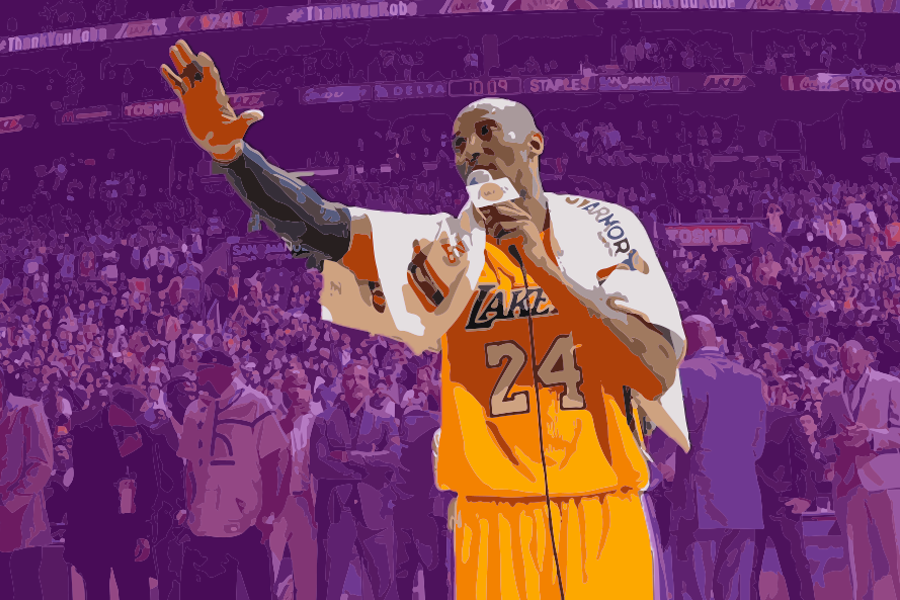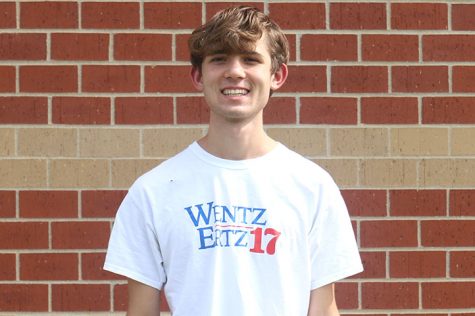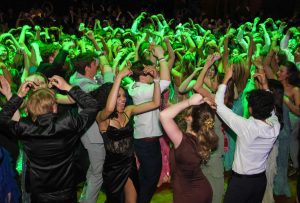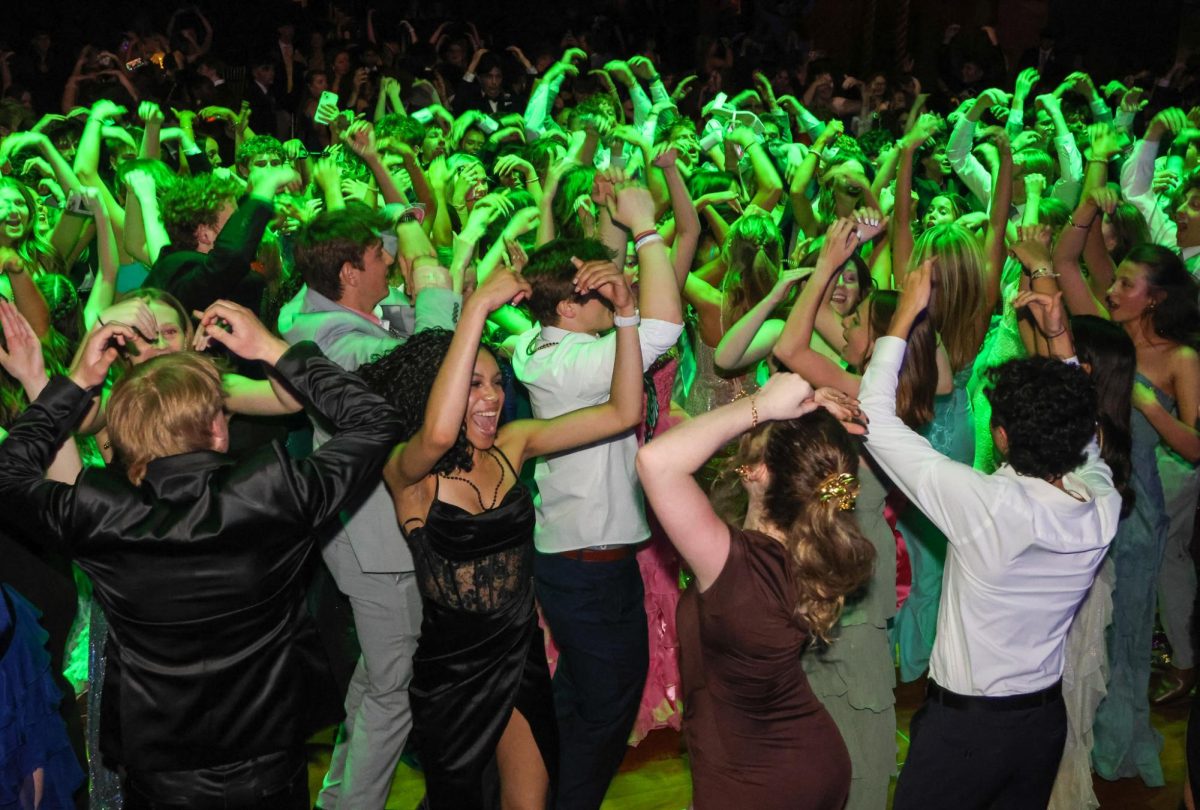What Kobe Bryant meant to me
After NBA superstar Kobe Bryant’s tragic death at 41 in a helicopter accident, a staff member recalls the impact Kobe had on his life
By CNN // photo illustration by Ben Wieland
Kobe Bryant, shown speaking to the Staples Center crowd before his final game, inspired a generation of basketball fans.
January 27, 2020
I used to hate basketball.
I didn’t understand the rules, or know the players or even really care about the game. I played one season of basketball in elementary school with a church-league team. I don’t remember our games, but I do remember that our coach would hand out gumballs before every game to the kids who memorized the Bible verse we learned at that week’s practice. For me, the gumballs — and the free candy we’d all get from the snack bar after our games — were far more memorable than the actual sport.
I do have one positive memory of real basketball — not the candy I associated with it, but the actual sport itself — from before middle school, and, ironically enough, it features Kobe Bryant. In this memory, which has been running idly in the back of my brain on repeat ever since the tragic news of Kobe’s death in a helicopter crash broke, I’m six years old, sitting in a hotel room while I watch the 2010 NBA Finals.
Since 2010, during the last few basketball-immersed years of my life, I’ve learned all about the statistical minutiae of that series — Kobe and Pau coming back from a 3-2 deficit against the hated Boston Celtics, and Ron Artest (now Metta World Peace) nailing a clutch three to seal the Lakers’ title. I’ll never forget the beauty from the game I watched, courtesy of one Kobe Bryant pivoting and fadeawaying and double-clutching his way to an NBA title.
During my gradual transition from basketball hater to NBA junkie over the last six years of my life, Kobe’s followed me every step of the way. The first time I teared up watching basketball came when I saw the Mamba, in the final game of his career, lead one last comeback and put up one last 60-point performance.
I remember tuning into TNT, mesmerized, to watch Kobe and Shaquille O’Neal settle their decade-long beef in an hour-long talk between the two. My mom didn’t understand why I cared so much about what amounted to reality TV and, honestly, neither did I. I just knew I had to watch because I didn’t want to miss what happened. Even in retirement, Kobe Bryant was always a must-watch.
In my own life, even when I couldn’t shoot a basketball to save my life, I pictured myself as the Mamba every time I made a four-foot bank shot in practice. I taught my clumsy, awkward self to shoot while fading away, spinning — to take the impossible shots that most players wouldn’t dream of attempting, but that Kobe knocked down routinely.
Sure, I was never good at those shots — or, to be brutally honest, anything on a basketball court. I wasn’t even skilled enough to play high school ball. But when I’d get on a hot streak in my driveway or at the rec center, I could momentarily picture myself proudly donning number 24 in front of a roaring Staples Center crowd. That fleeting feeling of floating on top of the world was like a drug, and chasing that high keeps me playing basketball to this day.
Then there’s Kobe off the court. The vaunted Mamba Mentality is his legacy — a sleep-deprived drive that Kobe possessed, a drive that forced him out of bed at 2 a.m. to get in a workout and kept him on the court after bad games, long after the fans filed out of the arena, shooting the ball, striving to improve. Kobe possessed a borderline superhuman work ethic; sleep be damned. I dreamed of one day working half as hard as he did towards my own dreams; to this day, every time I’m forced to wake up early for one reason or another, I picture Kobe in the gym, finishing a day’s worth of work before the sun even rises.
In a way, I guess it was fitting that I learned the tragic news of Kobe’s death while beside a basketball court. I was unlacing my new KD shoes and scrolling through Twitter when the news popped up in my timeline. Like everyone else, my grief began in the denial stage — a tabloidy TMZ headline surely couldn’t be true, could it? Then, once I realized that Kobe really was gone, I skipped a few stages straight to depression. I left the gym with my friend, holding back tears until I reached the solitary confines of my car. There, I finally let the lump in my throat out.
The rest of the day was a blur. I watched an ESPN reporter cry on air during a sideline interview, a SportsCenter host fall speechless and the usually-jovial Stephen A. Smith hold back tears while describing what Kobe meant to him. I stared in shock while the Raptors and Spurs intentionally took 24-second violations to honor the greatest 24 to ever play the game, choked up when Trae Young pointed to Bryant in the sky after nailing a half-court shot and cried while I watched NBA stars like Bradley Beal and Demar Derozan reduced to courtside tears after the passing of their idol.
I’m still grieving Kobe’s tragic death, along with the loss of his daughter Gianna. Gianna was well on her way to stardom, a basketball stud in her own right. And Kobe, too, was just getting started with his life in the entertainment world after basketball — it’ll be a long time before another human being wins five NBA titles and one Academy Award in the same lifetime.
But while Kobe is gone, his legend won’t be forgotten. I’ll certainly never forget the demigod who gave me a lifelong passion for the game of basketball. The NBA won’t forget his immeasurable contribution to the sport — Kobe became the first NBA player to ever have his jersey retired by multiple teams when Mavericks owner Mark Cuban announced that no Maverick would ever wear number 24 again. Kobe will live on through what he has inspired, the millions who yell his name every time they throw up a fadeaway jumper at the gym or toss a paper ball into a trash can.
Rest in peace, 24.
"Hoops are a little different up here, we all get one"
Rest in peace Kobe and Gigi and the 7 others in that tragic accident
Hug and kiss those that you love closely and regularly, you truly never do know when it might be too late. Rest in paradise. pic.twitter.com/6eTyECJeUY
— BossLogic (@Bosslogic) January 27, 2020













